 |
Monday
05 February 2001
 |
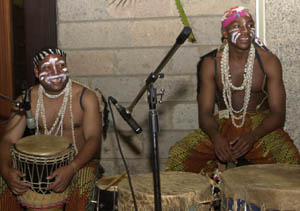 |
| Kenyan
and Tanzanian drummers kick off the 21st session of the UNEP GC in
Nairobi, accompanied by video messages urging universal responsibility
for the environment. |
The
21st session of the UNEP Governing Council and Second Global Ministerial
Environment Forum opened at UNEP headquarters in Nairobi, Kenya, with
a musical performance by a quintet of drummers, followed by opening speeches,
the election of officers and adoption of the agenda. Delegates then met
concurrently in a plenary session to consider the state of the environment
and in a Committee of the Whole to discuss UNEP's work programme, the
Environment Fund, and administrative and other budgetary matters.
|
|
| |
|
| |
 |
| László
Miklós, outgoing President, UNEP GC. |
Opening
Statements:
László
Miklós, the outgoing President of the Governing Council, noted some
significant achievements since the Governing Council's 20th Session
in 1999. He said 43 decisions had been adopted during the 20th session,
which had led to a number of positive decisions by the UN General Assembly.
He drew attention to the first Global Ministerial Environment Forum
that took place in Malmö, Sweden, in May 2000, and said the Malmö Declaration
had made a significant contribution to the UN Millennium Summit in September
2000, and to the World Summit on Sustainable Development (Rio+10) scheduled
for 2002 in South Africa.
|
| |
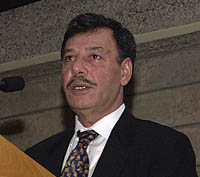 |
|
Shafqat
Kakakhel, UNEP Deputy Executive Director. |
- A
message by UN Secretary-General Kofi Annan was read by UNEP Deputy Executive
Director Shafqat Kakakhel. In his message, Kofi Annan said the
World Summit on Sustainable Development in 2002 should take concrete
action, including on the "vicious circle" of poverty and environment
degradation. He urged efforts to achieve ratification of the Kyoto Protocol
by 2002. He said strong financial support is necessary to address environmental
threats, and called for ongoing partnership among governments, civil
society and the private sector.
|
| |
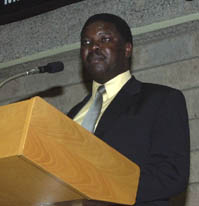 |
| Francis
Nyenze, Minister of Environment and Natural Resources, Kenya. |
Francis
Nyenze,
Kenyan Minister of Environment and Natural Resources, welcomed delegates
to Kenya and said the grave environmental situation demands international
cooperation. He highlighted links between environmental degradation,
poverty and lack of resources and said environmental policies must meet
basic needs and encourage sustainable economic growth in developing
countries. He highlighted disparities in energy consumption, and called
for sustained international commitment to improved energy efficiency
and renewable energy.
|
| |
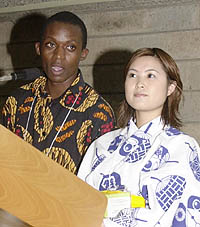 |
|
Shalala
Oliver Sepiso, Zambia, and Nanako Mizuno,
Japan, speak on behalf of the UNEP Youth Advisory Council. |
Representatives
of the UNEP Youth Advisory Council made a statement calling for
implementation of policies, not more meetings and negotiations. They
emphasized the link between poverty, overconsumption and environment
and called on governments to: cancel debt; fulfill ODA commitments of
0.7 % of national budgets; impose green taxes on international trade;
develop and utilize sustainable development indicators; and create incentives,
policies and measures to reduce consumption. They urged the establishment
of a trust fund for youth activities and said delegates involve youth
delegates in ensuring that words are turned into concrete actions.
|
| |
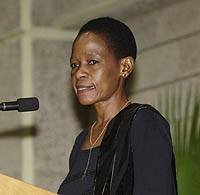 |
|
Anna
Tibaijuka, Executive Director, Habitat. |
Anna
Tibaijuka, Executive Director, Habitat, noted a revitalized spirit of
cooperation and synergy between UN Habitat and UNEP programmes. She highlighted
areas of joint operations and initiatives, such as the Sustainable Cities
Programme and the Urban Environmental Forum. On the issue of human settlements
and environment, she stressed that equitable sustainable development could
not be addressed without first achieving effective decision-making structures,
secure tenure and good urban governance. |
| |
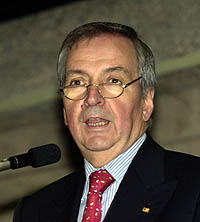 |
|
Klaus
Töpfer, UNEP Executive Director. |
UNEP
Executive Director Klaus Töpfer provided an outline of UNEP's programme
areas and activities. He identified major environmental challenges, including
the loss of biodiversity, energy concerns in Africa, the debate on genetically-modified
organisms, increasing global populations, rural to urban migration patterns
and environmental security issues. Noting the opportunity provided by the
upcoming World Summit on Sustainable Development to make progress on key
issues. On current and future global energy needs, he hoped discussions
on Africa's renewable energy needs would contribute to CSD-9. Citing recent
evidence on global climate change, he highlighted the need for a successful
conclusion to current climate negotiations. He also stressed the need to
address international governance issues and the value of cooperation with
civil society. He concluded by emphasizing that it was time for action to
implement existing international agreements and decisions. |
| |
|
|
|
Organization
of the Meeting:
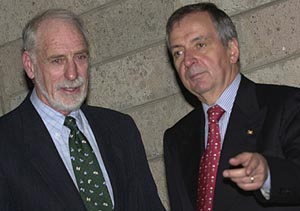 |
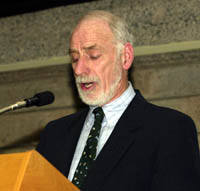 |
|
David
Anderson, Minster of the Environment, Canada,
with Klaus Topfer, Executive Director, UNEP. |
David
Anderson, accepts the position as UNEP
GC President. |
Following
the opening speeches, the Plenary elected the Bureau by acclamation: David
Anderson (Canada) as President; Rosa Elena Simeón Negrín (Cuba),
Janusz Radziejowski (Poland) and Tupuk Sutrisno (Indonesia)
as Vice-Presidents; and Kezimbira Miyingo (Uganda) as Rapporteur.
President Anderson underscored the clear link between the environment and
human health and noted the negative effects of globalization, noting that
the challenge is to find way to influence economic forces to work for the
environment. He said the World Summit on Sustainable Development presents
an opportunity to improve the lives of the next generation, but its success
depends on a number of factors, including the mobilization of both the private
sector and civil society, the use of innovative and inclusive strategies,
the identification of effective and acceptable solutions and the establishment
of institutions to support implementation of outputs. |
| |
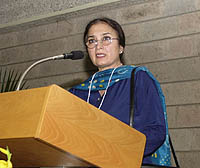 |
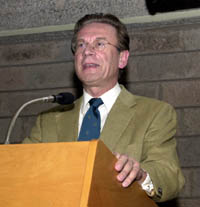 |
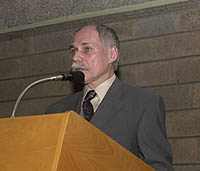 |
|
Representative
speaks on behalf of the NGO workshop. |
Representative
speaks on behalf of the Global Compact in Practice. |
Bedrich Moldan, Chair of the 9th Session of the CSD, Czech
Republic. |
|
| |
|
| |
Relevant
Information:
Past
IISD Coverage:
|
| |
|
| |
|
| |
|















